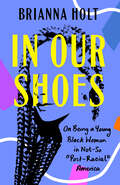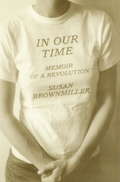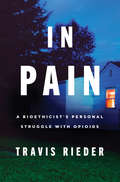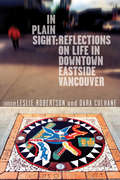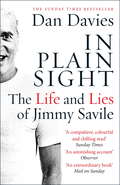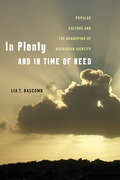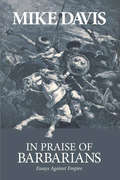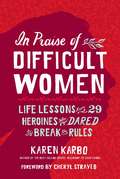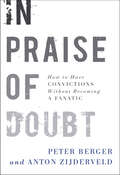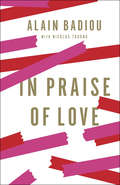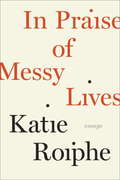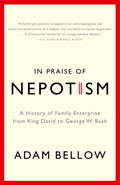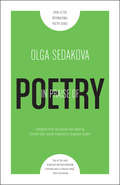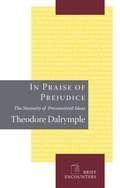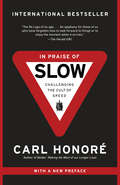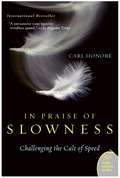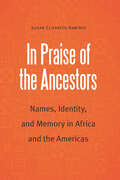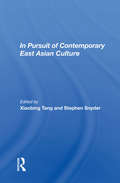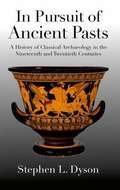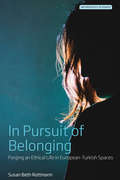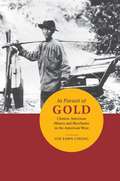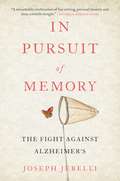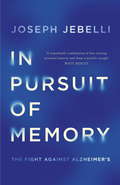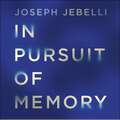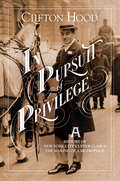- Table View
- List View
In Our Shoes: On Being a Young Black Woman in Not-So "Post-Racial" America
by Brianna HoltPart memoir, part cultural critique, In Our Shoes uses pop culture and author Brianna Holt&’s own lived experience to dissect the stereotypes and preconceived notions that young Black women must overcome in America today. In this fresh exploration of cultural appropriation, wokeness, tone policing, and more, Holt carefully dismantles myths about Black womanhood, allowing readers to assess their biases while examining the roles Black millennial women are forced to take on simply to survive. Through nine thoughtful chapters—such as &“Leave the Box Braids for the Black Girls&” and &“Why Are You So Dark?&”—laced with searing commentary, personal anecdotes from Brianna&’s own life, and interviews conducted with &“everyday&” Black women, In Our Shoes reveals the complexities of existence for Black women and creates a thought-provoking book that helps readers to learn, empathize, reflect, and, most importantly, act. A history, a work of criticism, a piece of reporting, and a call to action, In Our Shoes is a timely exploration of race and womanhood that will entertain, inspire, and inform in equal measures.
In Our Time
by Susan BrownmillerThere once was a time when the concept of equal pay for equal work did not exist, when women of all ages were "girls," when abortion was a back-alley procedure, when there was no such thing as a rape crisis center or a shelter for battered women, when "sexual harassment" had not yet been named and defined. "If conditions are right," Susan Brownmiller says in this stunning memoir, "if the anger of enough people has reached the boiling point, the exploding passion can ignite a societal transformation."In Our Time tells the story of that transformation, as only Brownmiller can. A leading feminist activist and the author of Against Our Will, the book that changed the nation's perception of rape, she now brings the Women's Liberation movement and its passionate history vividly to life.Here is the colorful cast of characters on whose shoulders we stand--the feminist icons Betty Friedan, Kate Millett, Germaine Greer, and Gloria Steinem, and the lesser known women whose contributions to change were equally profound. And here are the landmark events of the era: the consciousness-raising groups that sprung up in people's living rooms, the mimeographed position papers that first articulated the new thinking, the abortion and rape speak-outs, the daring sit-ins, the underground newspaper collectives, and the inventive lawsuits that all played a role in the most wide-reaching revolution of the twentieth century.Here as well are Brownmiller's reflections on the feminist utopian vision, and her dramatic accounts, rendered with honesty and humor, of the movement's painful internal schisms as it struggled to give voice to the aspirarations of all women. Finally, Brownmiller addresses that most relevant question: What is the legacy of feminism today?
In Pain: A Bioethicist’s Personal Struggle with Opioids
by Travis RiederA bioethicist’s eloquent and riveting memoir of opioid dependence and withdrawal—a harrowing personal reckoning and clarion call for change not only for government but medicine itself, revealing the lack of crucial resources and structures to handle this insidious nationwide epidemic.Travis Rieder’s terrifying journey down the rabbit hole of opioid dependence began with a motorcycle accident in 2015. Enduring half a dozen surgeries, the drugs he received were both miraculous and essential to his recovery. But his most profound suffering came several months later when he went into acute opioid withdrawal while following his physician’s orders. Over the course of four excruciating weeks, Rieder learned what it means to be “dope sick”—the physical and mental agony caused by opioid dependence. Clueless how to manage his opioid taper, Travis’s doctors suggested he go back on the drugs and try again later. Yet returning to pills out of fear of withdrawal is one route to full-blown addiction. Instead, Rieder continued the painful process of weaning himself.Rieder’s experience exposes a dark secret of American pain management: a healthcare system so conflicted about opioids, and so inept at managing them, that the crisis currently facing us is both unsurprising and inevitable. As he recounts his story, Rieder provides a fascinating look at the history of these drugs first invented in the 1800s, changing attitudes about pain management over the following decades, and the implementation of the pain scale at the beginning of the twenty-first century. He explores both the science of addiction and the systemic and cultural barriers we must overcome if we are to address the problem effectively in the contemporary American healthcare system. In Pain is not only a gripping personal account of dependence, but a groundbreaking exploration of the intractable causes of America’s opioid problem and their implications for resolving the crisis. Rieder makes clear that the opioid crisis exists against a backdrop of real, debilitating pain—and that anyone can fall victim to this epidemic.
In Plain Sight
by Dara Culhane Leslie A. RobertsonIn compiling this collection of seven life stories from Vancouver's Downtown Eastside, the editors set out to create a space for the voices of women who are seldom heard on their own terms - the words of people who are publicly visible yet who, due to the blur of preconceptions that surround the inner city, remain unseen.
In Plain Sight: The Life and Lies of Jimmy Savile
by Dan DaviesWinner of the 2015 Gordon Burn Prize and the 2015 CWA Non-Fiction DaggerShortlisted for the Orwell Prize and the James Tait Black PrizeDan Davies has spent more than a decade on a quest to find the real Jimmy Savile, and interviewed him extensively over a period of seven years before his death. In the course of his quest, he spent days and nights at a time quizzing Savile at his homes in Leeds and Scarborough, lunched with him at venues ranging from humble transport cafes to the Athenaeum club in London and, most memorably, joined him for a short cruise aboard the QE2. Dan thought his quest had come to an end in October 2011 when Savile's golden coffin was lowered into a grave dug at a 45-degree angle in a Scarborough cemetery. He was wrong. In the last two and a half years, Dan has been interviewing scores of people, many of them unobtainable while Jimmy was alive. What he has discovered was that his instincts were right all along and behind the mask lay a hideous truth. Jimmy Savile was not only complex, damaged and controlling, but cynical, calculating and predatory. He revelled in his status as a Pied Piper of youth and used his power to abuse the vulnerable and underage, all the while covering his tracks by moving into the innermost circles of the establishment.
In Plenty and in Time of Need: Popular Culture and the Remapping of Barbadian Identity (Critical Caribbean Studies)
by Lia T. BascombIn Plenty and in Time of Need demonstrates how the unique history of Barbados has contributed to complex relations of national, gendered, and sexual identities, and how these identities are represented and interpreted on a global stage. As the most widespread manifestation of social commentary, the book uses music and performance to analyze the competing ideals and realities of the national culture. It details the histories of prominent musical artists, including the prolific Pan-Africanist calypsonian the Mighty Gabby, the world-renowned Merrymen, Soca Queen Alison Hinds, artist/activist Rupee, and international superstar Rihanna. Using these artists, the project analyzes how femininity, masculinity, and sexuality are put in service of Barbadian nationalism. By examining websites, blogs, and digital products of these artists in conversation with Barbadian tourism, the book re-examines the ways in which commodity, sexuality, gender performance, and diasporic consciousness undergird individual careers and national representations.
In Praise of Barbarians: Essays Against Empire
by Mike DavisThe social critic and Set the Night on Fire co-author tackles the fashion for empires and white men’s burdens in this 2007 collection of radical essays.With In Praise of Barbarians, Mike Davis skewers contemporary idols such as Mel Gibson, Niall Ferguson, and Howard Dean; unlocks some secret doors in the Pentagon and the California prison system; visits Star Wars in the Arctic and vigilantes on the border; predicts ethnic cleansing in New Orleans more than a year before Katrina; recalls the anarchist avengers of the 1890s and “teeny-bopper” riots on the Sunset Strip in the 1960s; discusses the moral bankruptcy of the Democrats in Kansas and West Virginia; remembers “Private Ivan,” who defeated fascism; and looks at the future of capitalism from the top of Hubbert’s Peak.No writer in the United States today brings together analysis and history as comprehensively and elegantly as Mike Davis. In these contemporary, interventionist essays, Davis goes beyond critique to offer real solutions and concrete possibilities for change.Praise for Mike Davis“Davis remains our penman of lost souls and lost scenarios: He culls nuggets of avarice and depredation the way miners chisel coal.” —The Nation“A rare combination of an author, Rachel Carson and Upton Sinclair all in one.” —Susan Faludi, author of Backlash“Davis’ work is the cruel and perpetual folly of the ruling elites.” —New York Times
In Praise of Difficult Women: Life Lessons From 29 Heroines Who Dared To Break The Rules
by Cheryl Strayed Karen KarboFrom Frida Kahlo and Elizabeth Taylor to Nora Ephron, Carrie Fisher, and Lena Dunham, this witty narrative explores what we can learn from the imperfect and extraordinary legacies of 29 iconic women who forged their own unique paths in the world.Smart, sassy, and unapologetically feminine, this elegantly illustrated book is an ode to the bold and charismatic women of modern history. Best-selling author Karen Karbo (The Gospel According to Coco Chanel) spotlights the spirited rule breakers who charted their way with little regard for expectations: Amelia Earhart, Helen Gurley Brown, Edie Sedgwick, Hillary Clinton, Amy Poehler, and Shonda Rhimes, among others. Their lives--imperfect, elegant, messy, glorious--provide inspiration and instruction for the new age of feminism we have entered. Karbo distills these lessons with wit and humor, examining the universal themes that connect us to each of these mesmerizing personalities today: success and style, love and authenticity, daring and courage. Being "difficult," Karbo reveals, might not make life easier. But it can make it more fulfilling--whatever that means for you.In the Reader's Guide included in the back of the book, Karbo asks thought-provoking questions about how we relate to each woman that will make for fascinating book club conversation.
In Praise of Doubt: How to Have Convictions Without Becoming a Fanatic
by Peter Berger Anton ZijderveldIn Praise of Doubt explores how to survive the political, moral, and religious challenges raised by the extreme poles of relativism and fundamentalism.In this insightful and thought-provoking book, two world-renowned social scientists, Peter L. Berger and Anton C. Zijderveld, ask and answer Big Questions, offering invaluable guidance on how to have convictions without becoming a fanatic.“A book of great practical wisdom by authors who have profound insight into the intellectual dynamics governing contemporary life.” —Dallas Willard, author of Knowing Christ Today“The virus of fanaticism takes several forms. In Praise of Doubt targets two: fundamentalists and relativists. . . . Bracing . . . lay-friendly and seasoned with humor.” —The Boston Globe“The best parts of In Praise of Doubt explore the cultural battlegrounds where a consensus has broken down or not yet coalesced . . . Berger and Zijderveld are optimistic: They believe that moral progress is on the march and that moderation is a virtue everyone can agree on.” —The Wall Street Journal“This is . . . a serious attempt to explain how to find middle ground between conviction—religious and otherwise—and doubt . . . In fact, Berger and Zijderveld argue that doubt—especially as expressed in the idea of a loyal opposition—is at the heart of a democratic system.” —Los Angeles Times“This book addresses, both broadly and individually, how to balance dedication to strong religious and moral beliefs, while simultaneously being objective and discerning. This book grapples, in a thoughtful, entertaining way with these and other meaty philosophical questions.” —Reference & Research Book News
In Praise of Love
by Alain Badiou Nicolas TruongThe renowned French philosopher&’s &“ode to love&’s power to unite in the face of eternity, and its optimism in the face of pain&” (Publishers Weekly). In a world rife with consumerism, where online dating promises risk-free romance and love is all too often seen as a mere variant of desire and hedonism, Alain Badiou believes that love is under threat. Taking to heart Rimbaud&’s famous line &“love needs reinventing,&” In Praise of Love is the celebrated French intellectual&’s passionate treatise in defense of love. For Badiou, love is an existential project, a constantly unfolding quest for truth. This quest begins with the chance encounter, an event that forever changes two individuals, challenging them &“to see the world from the point of view of two rather than one.&” This, Badiou believes, is love&’s most essential transforming power. Through thought-provoking dialogue edited from a conversation between Badiou and Truong, a vibrant cast of thinkers are invoked: Kierkegaard, Plato, de Beauvoir, Proust, and more, create a new narrative of love in the face of twenty-first-century modernity. Moving, zealous, and wise, Badiou&’s &“paean to the anticapitalist, antiessentialist, unifying power of love&” urges us not to fear it but to see it as a magnificent undertaking that compels us to explore others and to move away from an obsession with ourselves (Publishers Weekly). &“Finally, the cure for the pornographic, utilitarian exchange of favors to which love has been reduced in America. Alain Badiou is our philosopher of love.&” —Simon Critchley, author of The Faith of the Faithless
In Praise of Messy Lives: Essays
by Katie RoipheThis powerful collection of essays ranges from pop culture to politics, from Hillary Clinton to Susan Sontag, from Facebook to Mad Men, from Joan Didion to David Foster Wallace to--most strikingly--the author's own life. For fans of the essays of John Jeremiah Sullivan and Jonathan Lethem. Katie Roiphe's writing--whether in the form of personal essays, literary criticism, or cultural reporting--is bracing, wickedly entertaining, and deeply engaged with our mores and manners. In these pages, she turns her exacting gaze on the surprisingly narrow-minded conventions governing the way we live now. Is there a preoccupation with "healthiness" above all else? If so, does it lead insidiously to judging anyone who tries to live differently? Examining such subjects as the current fascination with Mad Men, the oppressiveness of Facebook ("the novel we are all writing"), and the quiet malice our society displays toward single mothers, Roiphe makes her case throughout these electric pages. She profiles a New York prep school grad turned dominatrix; isolates the exact, endlessly repeated ingredients of a magazine "celebrity profile"; and draws unexpected, timeless lessons from news-cycle hits such as Arnold Schwarzenegger's "love child" revelations. On ample display in this book are Roiphe's insightful, occasionally obsessive takes on an array of literary figures, including Jane Austen, John Updike, Susan Sontag, Joan Didion, and Margaret Wise Brown, the troubled author of Goodnight, Moon. And reprinted for the first time and expanded here is her much-debated New York Times Book Review cover piece, "The Naked and the Conflicted"--an unabashed argument on sex and the contemporary American male writer that is in itself an exciting and refreshing reminder that criticism matters. As steely-eyed in examining her own life as she is in skewering our cultural pitfalls, Roiphe gives us autobiographical pieces--on divorce, motherhood, an emotionally fraught trip to Vietnam, the breakup of a female friendship--that are by turns deeply moving, self-critical, razor-sharp, and unapologetic in their defense of "the messy life." In Praise of Messy Lives is powerfully unified, vital work from one of our most astute and provocative voices.From the Hardcover edition.dcover edition.
In Praise of Nepotism
by Adam BellowA wide-ranging, surprising, and eloquently argued book that offers a pragmatic and erudite look at the innate human inclination toward nepotism—from ancient Chinese clans to families like the Gores, Kennedys, and Bushes. • &“Fascinating and well-researched.&” —Walter Isaacson, #1 New York Times bestselling author of The Code Breaker and Steve JobsNepotism is one of those social habits we all claim to deplore in America; it offends our sense of fair play and our pride in living in a meritocracy. But somehow nepotism prevails; we all want to help our own and a quick glance around reveals any number of successful families whose sons and daughters have gone on to accomplish objectively great things, even if they got a little help from their parents.Bellow explores how nepotism has produced both positive and negative effects throughout history. As he argues, nepotism practiced badly or haphazardly is an embarrassment to all (including the incompetent beneficiary), but nepotism practiced well can satisfy a deep biological urge to provide for our children and even benefit society as a whole. In Praise of Nepotism is a judicious look at a controversial but timeless subject that has never been explored with such depth or candor, and a fascinating natural history of how families work.
In Praise of Poetry
by Ksenia Golubovich Caroline Clark Olga Sedakova Stephanie SandlerAt an early age, Olga Sedakova began writing poetry and, by the 1970s, had joined up with other members of Russia's underground "second culture" to create a vibrant literary movement-one that was at odds with the political powers that be. This conflict prevented Sedakova's books from being published in the U.S.S.R. Instead, they were labeled as being too "esoteric," "religious," and "bookish." Until 1990, the only way her collections were available in Russian were in samizdat, hand-written copies, which circulated from reader to reader, building her reputation.In the 1990s, the situation changed dramatically, and now Sedakova has published twenty-seven volumes of verse, prose, translations, and scholarly research-although her work is woefully underrepresented in English translation.In Praise of Poetry is a unique introduction to her oeuvre, bringing together a memoir-essay written about her work, and two poetic works: "Tristan and Isolde," which is one of her most mysterious long poems, and "Old Songs," a sequence of deceptively simple poems that mix folk and Biblical wisdom.Olga Sedakova wrote prolifically during the 1970s, one of the "post-Brodsky" poets. Her complex, allusive style of poetry-generally labeled as neo-modernist or meta-realism-didn't fit the prescribed official aesthetics, so it wasn't available until the late 1980s. She currently teaches in the department of world culture at Moscow State University.Stephanie Sandler teaches Russian literature in the Slavic department at Harvard University. She co-translated Elena Fanailova's The Russian Version, which won the Best Translated Book Award for poetry in 2010.
In Praise of Prejudice: The Necessity of Preconceived Ideas
by Theodore DalrympleSociety thinks that those labeled as prejudice are the lowest of all. However, who is not? Dr. Dalrymple speaks from clinical experience as a low income hospital and prison doctor. He expresses that it would be impossible, moral and emotionally dishonest to eliminate all prejudice. It would also be detrimental to society as a whole.
In Praise of Slow: How a Worldwide Movement Is Challenging the Cult of Speed
by Carl HonoreTHE INTERNATIONAL BESTSELLER—NOW WITH NEW PREFACE • In the tradition of such trailblazing books as No Logo and The Tipping Point, In Praise of Slow heralds a growing international movement of people dedicated to slowing down the pace of our contemporary times and enjoying a richer, fuller life as a result. DON&’T HURRY, BE HAPPY These days, almost everyone complains about the hectic pace of their lives. We live in a world where speed rules and everyone is under pressure to go faster. But when speed is king, anyone or anything that gets in our way, that slows us down, becomes an enemy. Thanks to speed, we are living in the age of rage. Carl Honore has discovered a movement that is quickly working its way into the mainstream. Groups of people are developing a recipe for living better in a fast-paced, modern environment by striving for a new balance between fast and slow. In an entertaining and hands-on investigation of this new movement, Honore takes us from a Tantric sex workshop in a trendy neighbourhood in London, England to Bra, Italy, the home of the Slow Food, Slow Cities and Slow Sex movements. He examines how we can continue to live productive lives by embracing the tenets of the slow movement. A challenging take on the cult of speed, as well as a corrective look at how we can approach our lives with new understanding, In Praise of Slow uncovers a movement whose time has come.
In Praise of Slowness
by Carl HonoreWe live in the age of speed. We strain to be more efficient, to cram more into each minute, each hour, each day. Since the Industrial Revolution shifted the world into high gear, the cult of speed has pushed us to a breaking point. Consider these facts: Americans on average spend seventy-two minutes of every day behind the wheel of a car, a typical business executive now loses sixty-eight hours a year to being put on hold, and American adults currently devote on average a mere half hour per week to making love. Living on the edge of exhaustion, we are constantly reminded by our bodies and minds that the pace of life is spinning out of control. In Praise of Slowness traces the history of our increasingly breathless relationship with time and tackles the consequences of living in this accelerated culture of our own creation. Why are we always in such a rush? What is the cure for time sickness? Is it possible, or even desirable, to slow down? Realizing the price we pay for unrelenting speed, people all over the world are reclaiming their time and slowing down the pace -- and living happier, healthier, and more productive lives as a result. A Slow revolution is taking place. Here you will find no Luddite calls to overthrow technology and seek a preindustrial utopia. This is a modern revolution, championed by cell-phone using, e-mailing lovers of sanity. The Slow philosophy can be summed up in a single word -- balance. People are discovering energy and efficiency where they may have been least expected -- in slowing down. In this engaging and entertaining exploration, award-winning journalist and rehabilitated speedaholic Carl Honoré details our perennial love affair with efficiency and speed in a perfect blend of anecdotal reportage, history, and intellectual inquiry. In Praise of Slowness is the first comprehensive look at the worldwide Slow movements making their way into the mainstream -- in offices, factories, neighborhoods, kitchens, hospitals, concert halls, bedrooms, gyms, and schools. Defining a movement that is here to stay, this spirited manifesto will make you completely rethink your relationship with time.
In Praise of the Ancestors: Names, Identity, and Memory in Africa and the Americas (Borderlands and Transcultural Studies)
by Susan Elizabeth RamirezApart from collective memories of lived experiences, much of the modern world&’s historical sense comes from written sources stored in the archives of the world, and some scholars in the not-so-distant past have described unlettered civilizations as &“peoples without history.&” In Praise of the Ancestors is a revisionist interpretation of early colonial accounts that reveal incongruities in accepted knowledge about three Native groups. Susan Elizabeth Ramírez reevaluates three case studies of oral traditions using positional inheritance—a system in which names and titles are inherited from one generation by another and thereby contribute to the formation of collective memories and a group identity. Ramírez begins by examining positional inheritance and perpetual kinship among the Kazembes in central Africa from the eighteenth to the mid-twentieth centuries. Next, her analysis moves to the Native groups of the Iroquois Confederation and their practice of using names to memorialize remarkable leaders in the seventeenth and eighteenth centuries. Finally, Ramírez surveys naming practices of the Andeans, based on sixteenth-century manuscript sources and later testimonies found in Spanish and Andean archives, questioning colonial narratives by documenting the use of this alternative system of memory perpetuation, which was initially unrecognized by the Spaniards. In the process of reexamining the histories of Native peoples on three continents, Ramírez broaches a wider issue: namely, understanding of the nature of knowledge as fundamental to understanding and evaluating the knowledge itself.
In Pursuit Of Contemporary East Asian Culture
by Stephen Snyder Xiaobing TangThese critical essays examine East Asian culture through an interdisciplinary, cross-cultural lens. Readings of film, television, and visual and literary texts reveal the historical condition as well as the contemporary impulses driving East Asian culture today. We feel the muted tension in a rural South Korean village; we walk down the bustling streets of Hong Kong and witness the city's protean possibilities for a postrevolutionary reality. The boisterous tarento shows on Japanese television force us to rethink the nature of information and image production in relation to leisure management; cinematic spectacles in Japan, North Korea, Taiwan, and China point to complex issues of agency, the formation of the public sphere, and postnationalist identities. We see contemporary fiction from China and Japan engage themes of desire and remembrance as metaphors to express a profound historical anxiety. Mirroring the fast-moving and multifaceted landscape is our ability to move freely through time as we confront legitimizing narratives of modernization in early-twentieth-century Japan and, against an emerging regime of global capitalism, reexamine the approaching century in imagined historical hindsight. By anticipating the geocultural shift to the Asian Pacific Rim in the twenty-first century, this volume serves as both an introduction to contemporary East Asian culture and an exploration of its global context.
In Pursuit of Ancient Pasts: A History of Classical Archaeology in the Nineteenth and Twentieth Centuries
by Stephen L. DysonThe stories behind the acquisition of ancient antiquities are often as important as those that tell of their creation. This fascinating book provides a comprehensive account of the history and development of classical archaeology, explaining how and why artifacts have moved from foreign soil to collections around the world. As archaeologist Stephen Dyson shows, Greek and Roman archaeological study was closely intertwined with ideas about class and social structure; the rise of nationalism and later political ideologies such as fascism; and the physical and cultural development of most of the important art museums in Europe and the United States, whose prestige depended on their creation of collections of classical art. Accompanied by a discussion of the history of each of the major national traditions and their significant figures, this lively book shows how classical archaeology has influenced attitudes about areas as wide-ranging as tourism, nationalism, the role of the museum, and historicism in nineteenth- and twentieth-century art.
In Pursuit of Belonging: Forging an Ethical Life in European-Turkish Spaces (Anthropology of Europe #4)
by Susan Beth RottmannBelonging is a not a state that we achieve, but a struggle that we wage. The struggle for belonging is more difficult if one is returning to a homeland after many years abroad. In Pursuit of Belonging is an ethnography of Turkish migrants’ struggle for understanding, intimacy and appreciation when they return from Germany to their Turkish homeland. Drawing on an established tradition of life story writing in anthropology, Rottmann conveys the struggle to forge an ethical life by relating the experiences of a second-generation German-Turkish woman named Leyla.
In Pursuit of Gold: Chinese American Miners and Merchants in the American West
by Sue Fawn ChungBoth a history of an overlooked community and a well-rounded reassessment of prevailing assumptions about Chinese miners in the American West, In Pursuit of Gold brings to life in rich detail the world of turn-of-the-century mining towns in the Northwest. Sue Fawn Chung meticulously recreates the lives of Chinese immigrants, miners, merchants, and others who populated these towns and interacted amicably with their white and Native American neighbors, defying the common perception of nineteenth-century Chinese communities as insular enclaves subject to increasing prejudice and violence. While most research has focused on Chinese miners in California, this book is the first extensive study of Chinese experiences in the towns of John Day in Oregon and Tuscarora, Island Mountain, and Gold Creek in Nevada. Chung illustrates the relationships between miners and merchants within the communities and in the larger context of immigration, arguing that the leaders of the Chinese and non-Chinese communities worked together to create economic interdependence and to short-circuit many of the hostilities and tensions that plagued other mining towns. Peppered with fascinating details about these communities from the intricacies of Chinese gambling games to the techniques of hydraulic mining, In Pursuit of Gold draws on a wealth of historical materials, including immigration records, census manuscripts, legal documents, newspapers, memoirs, and manuscript collections. Chung supplements this historical research with invaluable first-hand observations of artifacts that she experienced in archaeological digs and restoration efforts at several of the sites of the former booming mining towns. In clear, analytical prose, Chung expertly characterizes the movement of Chinese miners into Oregon and Nevada, the heyday of their mining efforts in the region, and the decline of the communities due to changes in the mining industry. Highlighting the positive experiences and friendships many of the immigrants had in these relatively isolated mining communities, In Pursuit of Gold also suggests comparisons with the Chinese diaspora in other locations such as British Columbia and South Africa.
In Pursuit of Memory: The Fight Against Alzheimer's
by Joseph JebelliFor readers of Atul Gawande, Siddhartha Mukherjee, and Henry Marsh, a riveting, gorgeously written biography of one of history's most fascinating and confounding diseases--Alzheimer's--from its discovery more than 100 years ago to today's race towards a cure.SHORTLISTED FOR THE ROYAL SOCIETY SCIENCE BOOK PRIZE 2017Named "Science Book of the Month" by BooksellerAlzheimer's is the great global epidemic of our time, affecting millions worldwide -- there are more than 5 million people diagnosed in the US alone. And as our population ages, scientists are working against the clock to find a cure.Neuroscientist Joseph Jebelli is among them. His beloved grandfather had Alzheimer's and now he's written the book he needed then -- a very human history of this frightening disease. But In Pursuit of Memory is also a thrilling scientific detective story that takes you behind the headlines. Jebelli's quest takes us from nineteenth-century Germany and post-war England, to the jungles of Papua New Guinea and the technological proving grounds of Japan; through America, India, China, Iceland, Sweden, and Colombia. Its heroes are scientists from around the world -- many of whom he's worked with -- and the brave patients and families who have changed the way that researchers think about the disease.This compelling insider's account shows vividly why Jebelli feels so hopeful about a cure, but also why our best defense in the meantime is to understand the disease. In Pursuit of Memory is a clever, moving, eye-opening guide to the threat one in three of us faces now.
In Pursuit of Memory: The Fight Against Alzheimer's: Shortlisted for the Royal Society Prize
by Dr Joseph JebelliWhen Joseph Jebelli was twelve, his beloved grandfather began to act very strangely. It started with inexplicable walks, and gradually his bright smiles were replaced by a fearful, withdrawn expression. Before long, he didn't recognise his family any more. Dr Jebelli has dedicated his career to understanding Alzheimer's disease, which affects millions worldwide and 850,000 people in the UK alone. In this, his first book, Jebelli explores the past, present and future of Alzheimer's disease starting from the very beginning - the first recorded case more than one hundred years ago - right up to the cutting-edge research being done today. It is a story as good as any detective novel, taking us to nineteenth-century Germany and post-war England; to the jungles of Papua New Guinea and the technological proving grounds of Japan; to America, India, China, Iceland, Sweden, and Colombia; and to the cloud-capped spires of the most elite academic institutions. Its heroes are expert scientists from around the world - but also the incredibly brave patients and families who have changed the way scientists think about Alzheimer's, unveiling a pandemic that took us centuries to track down, and above all, reminding everyone never to take memory - our most prized possession - for granted. Based upon years of meticulous research, In Pursuit of Memory is a compelling insider's account of this terrible disease and the scientists who are trying to find a cure against the clock.
In Pursuit of Memory: The Fight Against Alzheimer's: Shortlisted for the Royal Society Prize
by Dr Joseph JebelliWhen Joseph Jebelli was twelve, his beloved grandfather began to act very strangely. It started with inexplicable walks, and gradually his bright smiles were replaced by a fearful, withdrawn expression. Before long, he didn't recognise his family any more. Dr Jebelli has dedicated his career to understanding Alzheimer's disease, which affects millions worldwide and 850,000 people in the UK alone. In this, his first book, Jebelli explores the past, present and future of Alzheimer's disease starting from the very beginning - the first recorded case more than one hundred years ago - right up to the cutting-edge research being done today. It is a story as good as any detective novel, taking us to nineteenth-century Germany and post-war England; to the jungles of Papua New Guinea and the technological proving grounds of Japan; to America, India, China, Iceland, Sweden, and Colombia; and to the cloud-capped spires of the most elite academic institutions. Its heroes are expert scientists from around the world - but also the incredibly brave patients and families who have changed the way scientists think about Alzheimer's, unveiling a pandemic that took us centuries to track down, and above all, reminding everyone never to take memory - our most prized possession - for granted. Based upon years of meticulous research, In Pursuit of Memory is a compelling insider's account of this terrible disease and the scientists who are trying to find a cure against the clock.(P)2017 John Murray Press
In Pursuit of Privilege: A History of New York City's Upper Class and the Making of a Metropolis
by Clifton HoodA history that extends from the 1750s to the present, In Pursuit of Privilege recounts upper-class New Yorkers' struggle to create a distinct world guarded against outsiders, even as economic growth and democratic opportunity enabled aspirants to gain entrance. Despite their efforts, New York City's upper class has been drawn into the larger story of the city both through class conflict and through their role in building New York's cultural and economic foundations. In Pursuit of Privilege describes the famous and infamous characters and events at the center of this extraordinary history, from the elite families and wealthy tycoons of the eighteenth and nineteenth centuries to the Wall Street executives of today. From the start, upper-class New Yorkers have been open and aggressive in their behavior, keen on attaining prestige, power, and wealth. Clifton Hood sharpens this characterization by merging a history of the New York economy in the eighteenth century with the story of Wall Street's emergence as an international financial center in the late nineteenth and early twentieth centuries, as well as the dominance of New York's financial and service sectors in the 1980s. Bringing together several decades of upheaval and change, he shows that New York's upper class did not rise exclusively from the Gilded Age but rather from a relentless pursuit of privilege, affecting not just the urban elite but the city's entire cultural, economic, and political fabric.
